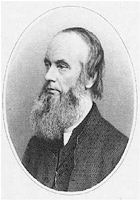Henry Alford
Henry Alford Poems
My hand is lonely for your clasping, dear;
My ear is tired waiting for your call.
I want your strength to help, your laugh to cheer;
...
Again the solemn season--and again
That bleeding Brow, those wounded Hands and Feet--
Again that piercèd Side my vision meet;
...
Here are the brows of Quantock, purple--clad
With lavish heath--bloom: there, the banks of Tone.
Where is that woman, love--forlorn and sad,
...
Tell me, thou mild and melancholy bird,
Whence learnedst thou that meditative voice?
For all the forest--passages rejoice,
...
Saviour of them that trust in Thee,
Once more, with supplicating cries,
We lift the heart and bend the knee,
And bid Devotion's incense rise.
...
The calm of blessed Night
Is on Judaea's hills;
The full--orbed moon with cloudless light
Is sparkling on their rills:
...
Say wilt thou think of me when I'm away,
Borne from the threshold and laid in the clay,
Past and forgotten for many a day?
...
My own dear country, thy remembrance comes
Like softly--flowing music on my heart;
With thy green sunny hills, and happy homes,
...
Who shall declare the secret of thy birth,
Thou old companion of the circling earth?
And having reached with keen poetic sight
...
I.
This tranquil Sabbath morn hath hushed the earth
Into unwonted calm. The clear pale hills
Lie beneath level lines of sunny clouds,
...
The stars are clear and frosty, and the Earth
Is laid in her first sleep, secure and calm;
The glorious works of God, as at the first,
...
'RISE,' said the Master, 'come unto the feast.'
She heard the call and rose with willing feet;
But thinking it not otherwise than meet
For such a bidding to put on her best,
...
The cowslip standeth in the grass,
The primrose in the budding grove
Hath laid her pale fair breast
On the green sward to rest:
...
I was a young fair tree:
Each spring with quivering green
My boughs were clad; and far
Down the deep vale, a light
...
While our shrub--walks darken,
And the stars get bright aloft,
Still we sit and hearken
To the music low and soft;
...
In token that thou shalt not fear
Christ crucified to own,
We print the Cross upon thee here,
And stamp thee his alone.
...
Thus sung I in these grounds erewhile, perchance
Tempted by sudden aptitude of words
Into that measure which least pleaseth me,
...
I have found Peace in the bright earth
And in the sunny sky:
By the low voice of summer seas,
And where streams murmur by;
...
When I am in my grave,
The busy clouds will wander on;
This Moon, that silver--tips each dancing wave,
Will shine as it hath shone.
...
By Babylon streams we sat us down and wept,
When we remembered Zion mournfully;
As for our harps, we hanged them up
...
Henry Alford Biography
Henry Alford (October 7, 1810 – January 12, 1871) was an English churchman, theologian, textual critic, scholar, poet, hymnodist, and writer. Alford was a talented artist, as his picture-book, The Riviera (1870), shows, and he had abundant musical and mechanical talent. Besides editing the works of John Donne, he published several volumes of his own verse, The School of the Heart (1835), The Abbot of Muchelnaye (1841), The Greek Testament. The Four Gospels (1849), and a number of hymns, the best-known of which are "Forward! be our watchword," "Come, ye thankful people, come," and "Ten thousand times ten thousand." He translated the Odyssey, wrote a well-known manual of idiom, A Plea for the Queen's English (1863), and was the first editor of the Contemporary Review (1866–1870). His chief fame rests on his monumental edition of the New Testament in Greek (4 vols.), which occupied him from 1841 to 1861. In this work he first produced a careful collation of the readings of the chief manuscripts and the researches of the ripest continental scholarship of his day. Philological rather than theological in character, it marked an epochal change from the old homiletic commentary, and though more recent research, patristic and papyral, has largely changed the method of New Testament exegesis, Alford's work is still a quarry where the student can dig with a good deal of profit. His Life, written by his widow, appeared in 1873 (Rivington).)
The Best Poem Of Henry Alford
You And I
My hand is lonely for your clasping, dear;
My ear is tired waiting for your call.
I want your strength to help, your laugh to cheer;
Heart, soul and senses need you, one and all.
I droop without your full, frank sympathy;
We ought to be together - you and I;
We want each other so, to comprehend
The dream, the hope, things planned, or seen, or wrought.
Companion, comforter and guide and friend,
As much as love asks love, does thought ask thought.
Life is so short, so fast the lone hours fly,
We ought to be together, you and I.
